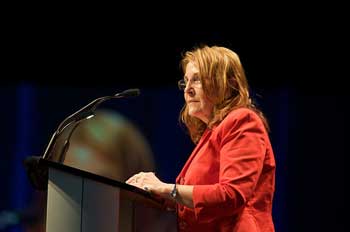On June 11, the second anniversary of the apology to survivors of residential schools made by the Prime Minister in the House of Commons, members of the General Synod 2010 unanimously passed Resolution A179-R2 which calls for greater participation of the church in the work of the Truth and Reconciliation Commission (TRC) of Canada.

Marie Wilson, Commissioner of the Truth and Reconciliation Commission (TRC) of Canada, addressed members of General Synod 2010 prior to introduction of the resolution.
Praising the work of General Synod 2010, Commissioner Wilson half-heartily said, “witnessing the unanimous support that your synod gave to your powerful resolutions brought forward to the General Synod by the Anglican Council of Indigenous Peoples has got me seriously considering that I would like to be adopted by the Anglicans.”
Commissioner Wilson spoke about the legacy of the residential schools from the twenty-five years she reported on northern and aboriginal issues at CBC-Radio Canada and with other media outlets. She also spoke of her experience as the wife of a former student. For years she said her husband was unable to speak of his school experiences to her. “Instead,” she said, ” he, like so many others we have heard from, denied anything happened to them.”
“More and more we hear about the residential schools as ‘a dark chapter in our history,” she said. “I don’t think we should understate it.”
Commissioner Wilson commented on the TRC involvement by the Anglican Church. “We know there is strong leadership in this church that is already committed and doing great work,” she said, naming specific individuals and also noted, “we know there is strong leadership in Aboriginal communities right across the country.”
Despite strong leaders, she cautioned members of General Synod to, “gear up for the long haul.” Reconciliation will not come over night, “accept that you may not get the forgiveness you are looking for as a church, as an institution. Some people may not be there even though your church has offered such a beautiful and heartfelt apology. Forgiveness and reconciliation are not the same time.”
Both houses of General Synod unanimously passed Resolution A179-R2: Anglican Participation in the Truth and Reconciliation Commission of Canada. The resolution calls for the General Synod to affirm the goals of the TRC; request the General Secretary and the Council of General Synod ensure adequate resources for the Anglican Church of Canada to support and participate fully in the work of the TRC over the next five years; reaffirm the three goals of the Equipping Ambassadors of Reconciliation conference of November 2009; and recommend that the Anglican Church of Canada co-host at least two and up to three more events modeled after the first Equipping Ambassadors of Reconciliation conference.
Over 350 delegates and special guests came from coast to coast to coast across Canada for this nine-day event, which takes place each triennium. Further details and highlights are available online at www.anglican.ca
Interested in keeping up-to-date on news, opinion, events and resources from the Anglican Church of Canada? Sign up for our email alerts .
